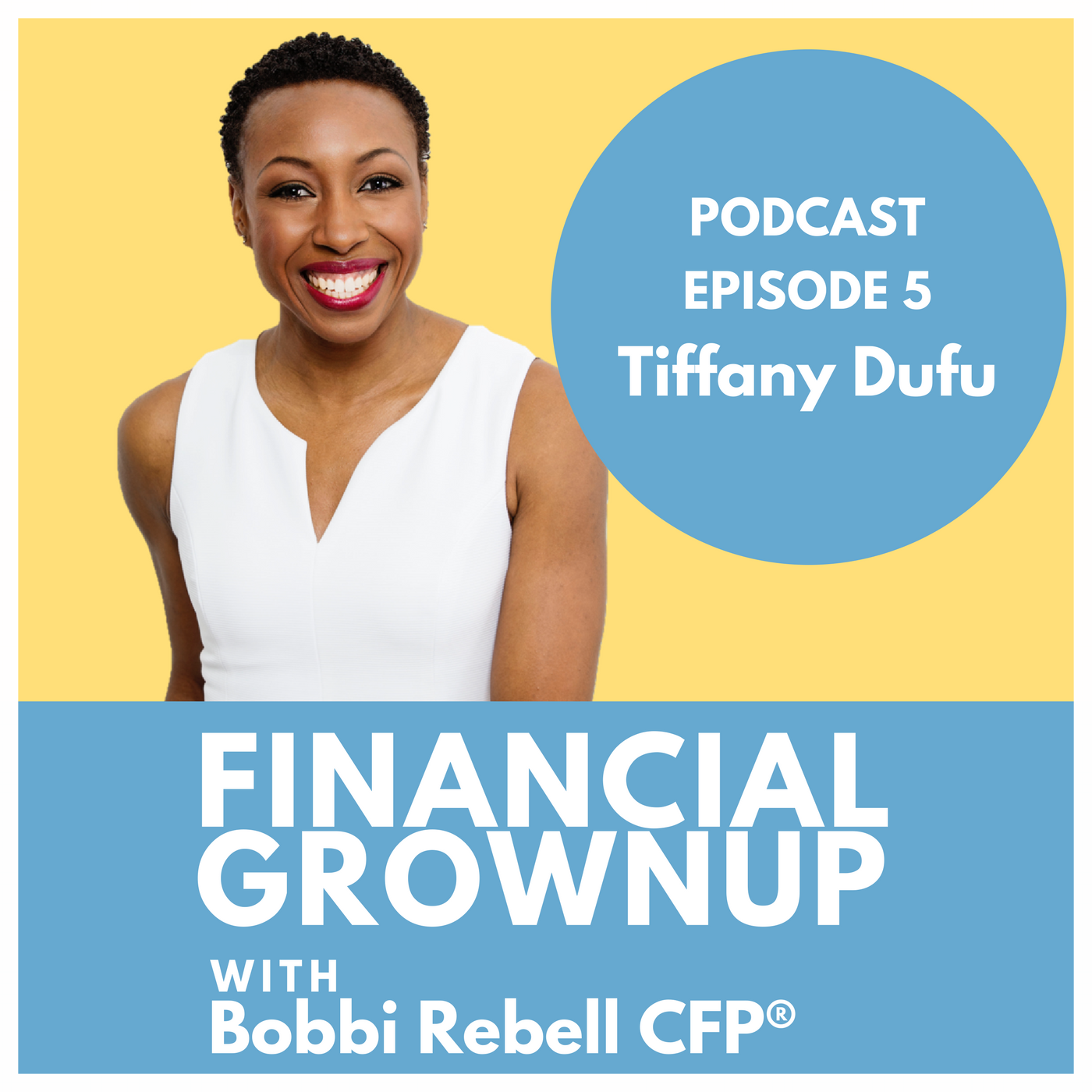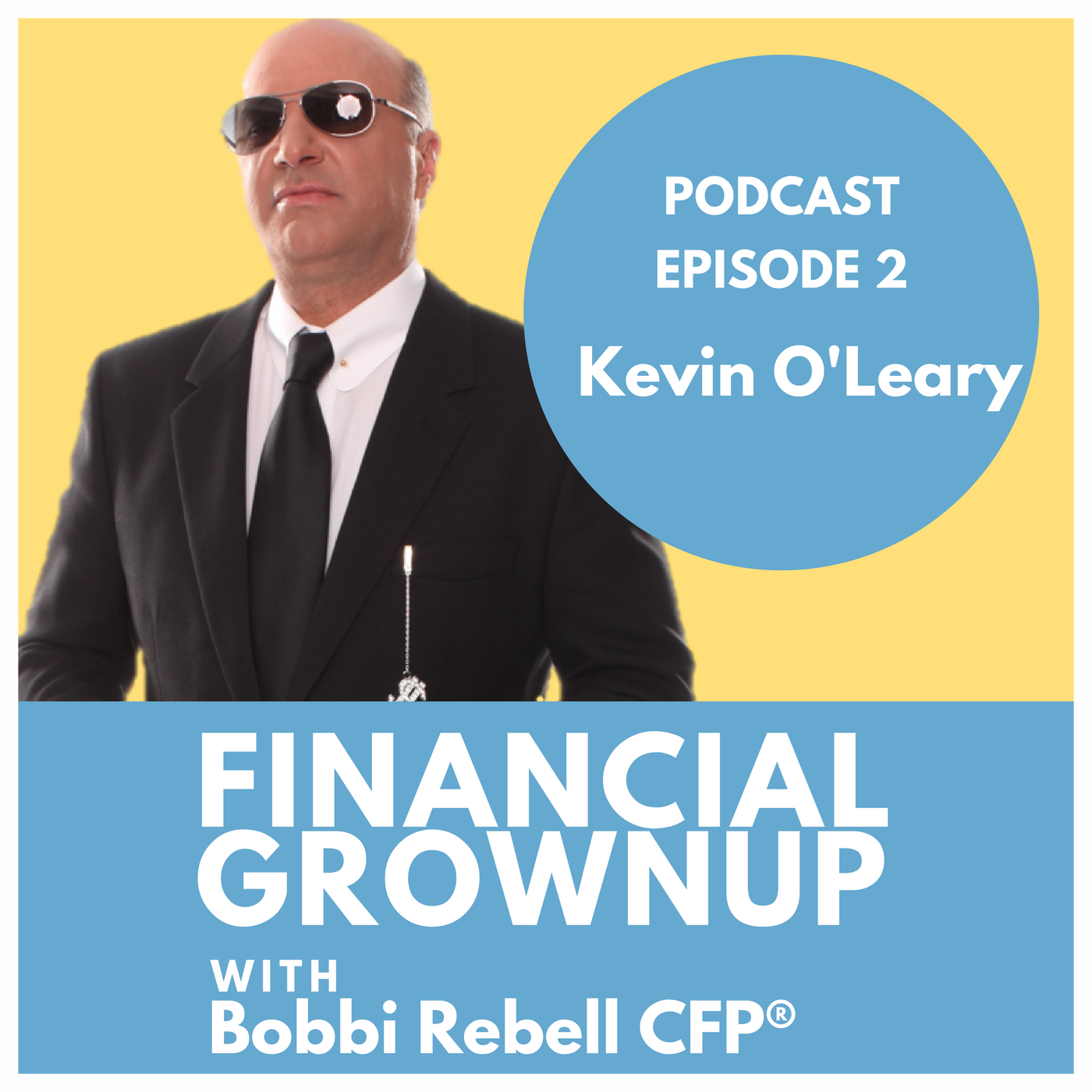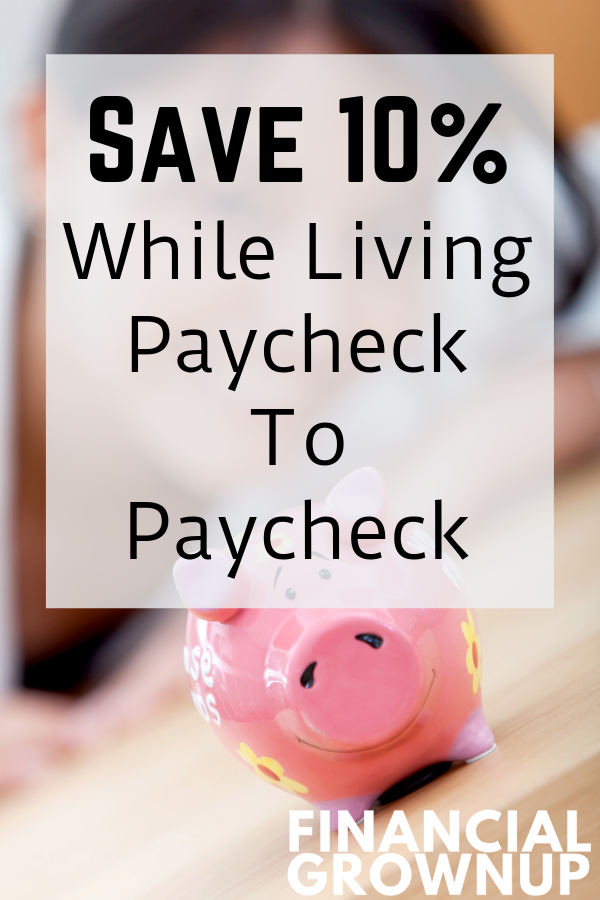Transcription
Kevin O'Leary:
The executor called me and said, "Look, your mother has kept a secret account from both of your husbands her whole life, you should come here because you're not going to be executor of this".
Bobbi Rebell:
You're listening to Financial Grown Up, with me, Certified Financial Planner, Bobbi Rebell, author of How To Be A Financial Grown Up, and you know what, being the grown up is really hard, especially when it comes to money. But it's okay, we're gonna get there together. I'm gonna bring you one money story from a financial grown up, one lesson, and then my take on how you can make it your own. We got this.
Bobbi Rebell:
Hey friends, welcome to this edition of Financial Grown Up, and for those of you who have not guessed yet, yes that was the voice of Kevin O'Leary, aka Mr. Wonderful on Shark Tank. He is going to join us in just a moment to share a story about a secret, a financial lesson secret that he learned from his mother only after she passed away. It is a great story and it's gonna change your whole mindset about how you think about investing, so stick with me here. I just want to do a quick introduction to Kevin, tell you guys a little bit more about him for the maybe one or two people out there that don't know exactly who Kevin O'Leary is.
Bobbi Rebell:
He is a serial entrepreneur. He's got his own ventures including an investment company that focuses on dividend ETS. He also is in the wine business and of course, O'Leary Venture supports all the Shark Tank companies that he's invested in. Recent success of note, Plated, which he sold for a cool 300 million dollars. He's also got a really interesting app I want you guys to hear about and you will hear about it in just a moment. Here is Kevin O'Leary.
Bobbi Rebell:
Kevin O'Leary you are a financial grown up and I'm so excited you are on the podcast. Welcome.
Kevin O'Leary:
Great to be here. Thank you so much.
Bobbi Rebell:
And you are, of course, so special in my heart because you are such an advocate for financial literacy. You make it part of everything that you do, including your entrepreneurial ventures. Before we get to the financial grown up moment that you're gonna share with us, I do wanna have you tell us more about the app Beanstox. Tell us about Beanstox.
Kevin O'Leary:
You know, for the last few years I've been teaching at colleges and high schools and I've just been stunned by the fact that we teach young people in America pretty well everything about math and reading, geography, even sex education, but we never talk to them about financial literacy. We never teach them how to invest, and even when I teach graduating cohorts of engineers at places like MIT, Harvard, Notre Dame, Temple, I'm blown away that these young people going off in the workforce have never bought a stock or bonds.
Kevin O'Leary:
So, the genesis of Beanstox, and I've spelt it B-E-A-N-S-T-O-X, is an app. You download it and it allows you to buy fractional shares of your favorite stocks or exchange traded funds, which means if you only have $2 to invest, or $5, or $10 or whatever you've got, you can actually own a real share and learn about how the prices go up and down, when dividends get paid, and just to build a diversified portfolio. I find when you do that on your mobile device, you actually watch it every day. Some people go on 10 times a day, and I've just been thrilled.
Kevin O'Leary:
Hundreds of thousands of them have been downloaded now. People have set up accounts, even if they only put in 50 bucks a month, it's great to start investing because the truth about America is the average salary is $52,000 a year, and if you started investing just 10% of your income at the age of 22, by the time you're 65, if the markets do what they have done for the last 50 years, which is give you six to seven percent a year of return, you'll have 1.2 million dollars sitting in the bank for-
Bobbi Rebell:
Very nice, all right, everybody check out Beanstox now. I'm really excited for you to share your financial grown up moment money story because my mom passed away a few years ago and it's, in some ways, only in retrospect that I learned some really important lessons from her, and you learned a big lesson from your mom at that time.
Kevin O'Leary:
Yes, when she passed away, I was the older son. I'm two years older than my brother, so the executer called me and said, "Look, your mother's kept a secret account from both of her husbands her whole life, you should come here because you're now gonna be the executor of this" and when I got there, I was blown away. I mean she ... I had always wondered how she'd provided for my brother and I, her sisters, and her extended family. She always seemed to have money, and what she had done is she had done exactly that.
Kevin O'Leary:
She had put aside more than 10% of her paycheck when she was a young woman, and she invested in two types of securities. 50% of this portfolio were in large cap dividend paying stocks, and the other half were in Telco bonds, five to seven year bonds and her thinking was that nobody would ever let their phone be disconnected by not paying their bill, so she trusted Telco Company, and this portfolio, over 50 years, outperformed everybody else in the family's, so I did some research.
Kevin O'Leary:
It really changed my mind forever about investing. 70% of the returns of the stock market over the last 50 years have come from dividends, not capital appreciation, so I never buy a stock today that doesn't pay a dividend. I learned that from my mother, and her whole mantra was never spend the principle, only the interest. She was so right about that.
Bobbi Rebell:
And it's interesting because that really did inform your whole approach to investing and your whole business, when it comes to your ETF business.
Kevin O'Leary:
Yes. O'Shares is build around her philosophy. We don't have a single security in any of our O'Shares funds, including the new midcap one OUSM. The reason I'm really intrigued with midcap stocks in America today, the ones that pay dividends, is because of this tax reform. They used to pay 36% tax, now they pay 21, so their cash flows this year are going to grow up by 15 to 20% more free cash. And if you look at the Russell 2,000, which is the universe of all the small companies in America, 339 are profitable and pay tax, and they're all captured in OUSM.
Bobbi Rebell:
Wow, all right so, what is the take away lesson from that story? Do you wish, for example, that you talked to your mom more about her money philosophy and what she was doing?
Kevin O'Leary:
Basically the take away story is this. When you start saving, there's two aspects to your saving. There's the principal, the money you're putting away, and then there's the interest you make off the principal, or the dividends you get if you bought a stock. What she basically said was it's okay to spend and live off the dividends and interest, but it's not okay to spend the principal, because once you spend the principal, you never get it back.
Kevin O'Leary:
The principal is what makes the money for you, so that philosophy is, you live off interest, you live off dividends, and that's how you monetize your lifestyle, but you never dip in to your principal. Some people say, well I really wanna buy a boat, I wanna buy a bigger house, I wanna buy something and I can't because I don't make enough, and they spend their principal. That always ends badly.
Bobbi Rebell:
Wow, all right. Your mom was definitely a financial grown up and certainly we appreciate you sharing what she taught you.
Bobbi Rebell:
Before you go, give us a money tip for our listeners. Something that you do that maybe they can emulate that can make a difference in their financial wellbeing right now. Something they can implement today.
Kevin O'Leary:
I've learned this years and years ago, and again taught to by my mother. When you go out every day, the whole world is designed to take money from you. That's how they market and tell you to buy this or get a new latte or buy new jeans or a new pair of shoes. Every time you get tempted to buy something, and I do this even to this day, I ask myself, do I really need this thing, do I really need it because when I take it, I take my cash and I buy it, I'm basically killing those dollars in terms of them making me interest or dividends because I bought those shoes or I bought those pants or I bought whatever it was.
Kevin O'Leary:
People say to me, well I can't save 10% of my salary. I'm living paycheck to paycheck, and I always remind them what my mother said, yes you can. You buy so much crap that you don't need and anybody can look in their closet and look at all the stuff they don't wear anymore. The shoes they don't wear or the junk they bought, and so I've really, really learned, buy really good things once in a while. And I'll tell you the anecdotal story.
Kevin O'Leary:
When my mother passed away, the women in my family fought like cats or dogs because all her clothes were Channel and Gucci and really good stuff that she kept for decades, but she didn't buy any crap, and that was her lesson to me. Buy a good suit. Buy a great pair of shoes, but don't buy a bunch of junk. That way you feel good about what you own, but you save a lot of money, and I've been able to cut my spending by a ton because I don't buy crap, and because she taught me that.
Kevin O'Leary:
Even wealthy people I work with, I do this special test with them, I say get a piece of paper, just two sheets, you don't need any technology.
Bobbi Rebell:
Oh no.
Kevin O'Leary:
And write down all of the things you make money from in 90 days, and all the money you spend in 90 days, and even really wealthy people outspend their income, and they learned sobering basis. That's my lesson. Do your 90 day test, but don't buy crap. You don't need it.
Bobbi Rebell:
Thank you so much Kevin O'Leary. It was such a pleasure having you. We will all keep tuning in to Shark Tank and all your other ventures, thank you.
Kevin O'Leary:
Take care.
Bobbi Rebell:
I always love talking with Kevin O'Leary, he's an amazing advocate for financial literacy and such an inspiration. Here is my take and it probably won't surprise you guys. Financial grown up tip number one, talk to your parents about money, and yes, get their advice, but also try to get them to open up about what they did right and also, just as important, what they would have done differently. Get them to share their financial grown up moments, their money stories. When we're kids, our parents often shelter us from what is really going on behind the scenes in our daily lives.
Bobbi Rebell:
For example, I remember as a teenager, my family moved into a bigger and newer house. Now, I didn't think that much about it, when I saw my mom putting towels over the windows. It was a little weird, but you know parents can be weird. What I learned later on was that they had really stretched to buy the house, and they were waiting, holding off to buy the window coverings, so my mom was basically making due with what she had, and really, it was just fine, no big deal.
Bobbi Rebell:
All right, financial grown up tip number two, if and when you have kids, make a plan for how you want them to learn about money. There is no right or wrong plan here, every kid has different ways of learning and every family has different things that are right for them. Find out what works for you guys.
Bobbi Rebell:
Some resources though, I am a big fan of a book called The Opposite Of Spoiled by Ron Lieber. Another classic to check out, Smart Money, Smart Kids by Dave Ramsey and Rachel Cruise, and finally, Make Your Kid A Money Genius by Beth Kobliner. Check them out. And, for fun, I was recently gifted a book at FinCon by Scott Allen Turner called Money A To Z. It was a lot of fun to read with my child, and of course, don't shy away from business stories for kids, especially as they get older.
Bobbi Rebell:
Harry is now 10 and we are reading about Steve Jobs. The actual book title if you guys wanna check it out is Steve Jobs The Man Who Thought Different. It is by Karen Blumenthal. It's opening up a lot of discussions about funding a start up and all the different things that go into a business. It's also interesting to read about Steve Jobs and all of his personal quirks, so I will leave it to you guys to see if you wanna read that book with your children or just check it out yourself.
Bobbi Rebell:
Thank you all for listening to Financial Grown Up. We are new and we need your support. Please subscribe to this podcast and then of course, be sure to rate and review it on iTunes and especially please share this with your friends. And until next time, I am wishing all of you financial freedom.
Bobbi Rebell:
Financial Grown Up with Bobbi Rebell is a BRK Media production.
















